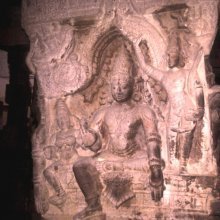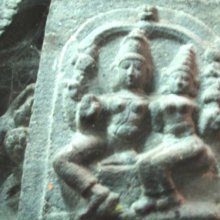Let, Leṭ: 4 definitions
Introduction:
Let means something in Hinduism, Sanskrit. If you want to know the exact meaning, history, etymology or English translation of this term then check out the descriptions on this page. Add your comment or reference to a book if you want to contribute to this summary article.
Images (photo gallery)
(+13 more images available)
In Hinduism
Vyakarana (Sanskrit grammar)
Source: Wikisource: A dictionary of Sanskrit grammarLeṭ (लेट्).—A general term for the affixes of the Vedic subjunctive, the usual personal-endings ति, तस् (ti, tas) etc. being substituted for लेट् (leṭ) as in the case of other tenses and moods. The augments अट् (aṭ) and आट् (āṭ) are sometimes prefixed to the लेट् (leṭ) affix and the sign (विकरण (vikaraṇa)) स् (s) (सिप् (sip)) is sometimes added to the roots. The forms of लेट् (leṭ) are to be arrived at as they are found actually used in Vedic language, even by placing personal-endings of a person or number different from what is actually required.

Vyakarana (व्याकरण, vyākaraṇa) refers to Sanskrit grammar and represents one of the six additional sciences (vedanga) to be studied along with the Vedas. Vyakarana concerns itself with the rules of Sanskrit grammar and linguistic analysis in order to establish the correct context of words and sentences.
Languages of India and abroad
Sanskrit dictionary
Source: DDSA: The practical Sanskrit-English dictionaryLeṭ (लेट्).—A technical term used by Pāṇini to denote the Vedic Subjunctive Mood or its terminations.
Source: Cologne Digital Sanskrit Dictionaries: Cappeller Sanskrit-English DictionaryLeṭ (लेट्).—[substantive] the conjunctive & its endings ([grammar]).
Source: Cologne Digital Sanskrit Dictionaries: Monier-Williams Sanskrit-English DictionaryLeṭ (लेट्):—(in gram.) Name of the terminations of the Vedic Subjunctive Mood or Name of that Mood itself.
Sanskrit, also spelled संस्कृतम् (saṃskṛtam), is an ancient language of India commonly seen as the grandmother of the Indo-European language family (even English!). Closely allied with Prakrit and Pali, Sanskrit is more exhaustive in both grammar and terms and has the most extensive collection of literature in the world, greatly surpassing its sister-languages Greek and Latin.
See also (Relevant definitions)
Starts with (+40): Let-thoke, Leta, Leta la phofu, Leta-laphofu, Leta-myatara, Letaguti, Letai, Letakaiko, Letakamta, Letana, Letanem, Letapiso, Letara, Letara-baksa, Letarabaksa, Letaunu, Letcam, Letcumi, Letcumimaram, Letebo.
Ends with (+92): African finger millet, African millet, American dog violet, Angbalet, Arctic yellow violet, Arrowleaf violet, Australian millet, Awned barnyard millet, Balet, Barnyard millet, Birdfoot violet, Boer millet, Bracelet, Broom millet, Broom-corn millet, Broomcorn millet, Brown corn millet, Bullrush millet, Bulrush millet, Bwa kotlet.
Full-text (+1674): Bharyata, Parityakta, Muc, Papeti, Sodanem, Cajati, Ativah, Utsrashtukama, Moksh, Shandata, Uttareti, Shranthita, Milleti, Nissajati, Millati, Ossajati, Pakirati, Ambumuc, Payomuc, Trada.
Relevant text
Search found 483 books and stories containing Let, Leṭ; (plurals include: Lets, Leṭs). You can also click to the full overview containing English textual excerpts. Below are direct links for the most relevant articles:
Vinaya Pitaka (2): Bhikkhuni-vibhanga (the analysis of Nun’ rules) (by I. B. Horner)
Vinaya Pitaka (1): Bhikkhu-vibhanga (the analysis of Monks’ rules) (by I. B. Horner)
Monks’ Forfeiture (Nissaggiya) 28
Monks’ Forfeiture (Nissaggiya) 16
Monks’ Expulsion (Pārājika) 1: Permutations < [Monks’ Expulsion (Pārājika) 1]
Vasudevavijaya of Vasudeva (Study) (by Sajitha. A)
Sugalārthamālā of Peruntānam Nārāyaṇan Nampūtiri < [Chapter 1 - Śāstrakāvyas—A Brief Survey]
Lakāra-artha < [Chapter 3 - Vāsudevavijaya—A Grammatical Study]
Parables of Rama (by Swami Rama Tirtha)
Story 95 - Inspired Life < [Chapter XIV - Oneness]
Story 31 - Worldly Blessing a Curse < [Chapter V - Happiness]
Story 21 - Subtle body of the Realized Soul < [Chapter IV - God-consciousness]
Kautilya Arthashastra (by R. Shamasastry)
Chapter 9 - Protection of All Kinds of Government Departments < [Book 4 - Removal of Thorns]
Chapter 12 - Sexual Intercourse with Immature Girls < [Book 4 - Removal of Thorns]
Chapter 4 - Spies with Weapons, Fire and Poison < [Book 12 - Concerning a Powerful Enemy]
Rig Veda (translation and commentary) (by H. H. Wilson)
Related products
(+42 more products available)











